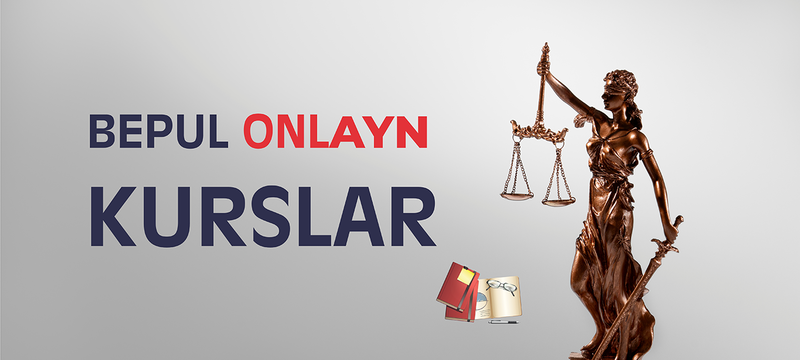The main objectives of the Institute are:
Retraining and advanced training of employees of justice bodies and institutions, specialists in the field of legal services, advocacy, notary, forensic examination, archival affairs, office management, executive discipline, work with citizens' appeals, mediation, and intellectual property, taking into account modern requirements and processes;
Providing customers with the opportunity to independently choose forms of advanced training based on professional needs;
Introduction and development of forms of dual education, combined with work activities;
Training of legal personnel capable of adequately representing the interests of the Republic of Uzbekistan at the international level in accordance with international standards.
Retraining of individuals with higher education in legal specialties;
Retraining and advanced training of teaching staff who teach legal disciplines in general education schools, secondary specialized and vocational educational institutions (with non-legal higher education), as well as teachers of legal disciplines in the vocational and higher education system – within the established timeframe;
Organization of training courses to improve the legal literacy of civil servants, representatives of the private sector and civil society institutions working in legal and non-legal fields;
Targeted training of specialists from organizations on a contractual basis, based on their needs, with legal analysis of internal documents, record management procedures, contractual relations, and professional knowledge and skills of personnel;
Creation of digital educational resources for professional development, continuous development of theoretical knowledge and practical skills of personnel, and their regular assessment.
Enhancing personnel potential through the use of a credit-module system and the implementation of case methods and situational training in legal education.
Providing research, methodological, and advisory support to the activities of justice bodies, legal services, forensic examination, archival affairs and record keeping, as well as developing evidence-based proposals for their further improvement.
Implementing fundamental, applied, and innovative scientific research on topical issues of law enforcement and jurisprudence, involving national, foreign, and international grants.
Broadly engaging highly qualified domestic and foreign specialists in retraining, professional development, and research activities, and expanding international cooperation through the exchange of best teaching practices.
2024 Performance Indicators:
25,925 participants were trained within the framework of 103 educational programs and 376 training modules for advanced training courses;
225 participants underwent retraining in legal specialties;
100 law professors from universities and 142 high school law teachers underwent retraining and advanced training;
7 Memoranda of Understanding were signed with specialized educational institutions in Japan, Kazakhstan, Turkey, Russia, Azerbaijan, and Belarus;
25 participants completed short-term internships in Turkey, Russia, and Japan;
A short-term advanced training course on “Legal Tech and Artificial Intelligence in the Legal Profession” in accordance with international standards was organized with the participation of specialists from White & Case (USA), Oxford University, and the University of Twente. 81 participants received international certificates from the Ministry of Justice and Oxford University.
• Courses for training professional mediators were organized, resulting in the training of 318 mediators;
• The Kh. Suleimanova Republican for Forensic Expertise conducted legal awareness courses for 157 specialists, including 62 specializing in forensic expertise;
• 592 attendees completed training at the Center for Archival Affairs and Records Management.
Organization of activities:
• The Institute is headed by a Director, appointed and dismissed by the Minister of Justice of the Republic of Uzbekistan;
• The scientific potential of the Institute is 64%, including: 2 Doctors of Science (DSc), 4 Associate Professors, 7 Doctors of Philosophy (PhD);
• The Institute cooperates with 13 international organizations operating in Uzbekistan;
• A unified platform "Digital Institute" is being created;
• Institute students actively use more than 8,000 books, as well as the legal information systems Lex.uz, Norma, and Yurida, located in the information and resource center.
International Cooperation:
The Institute has established close cooperation with international and foreign organizations operating in the republic, including:
United Nations Development Programme (UNDP),
Regional Office for Central Asia of the United Nations Office on Drugs and Crime (UNODC),
UNICEF,
The OSCE Project Co-ordinator in Uzbekistan,
International NGO "Regional Dialogue" (Slovenia),
USAID (USA),
The German society GIZ,
Friedrich Ebert Foundation and Konrad Adenauer Foundation.
With the support of international partners, seminars, short summer and winter training courses, as well as master classes are held annually to improve the skills of the Institute's teachers and students.
Spiritual and cultural events are organized for the Institute's teachers and staff, with the participation of former employees, scientists, lawyers, and prominent figures in the country's arts.
The educational activities of the Institute are carried out on the basis of:
• legislation of the Republic of Uzbekistan,
• directions and modern requirements for the modernization of state and public life,
• improvement of the judicial and legal system,
• political, social, economic and legal reforms,
• international standards and best practices of developed countries.
The Institute's programs are developed based on state requirements for the retraining and advanced training of legal personnel.




